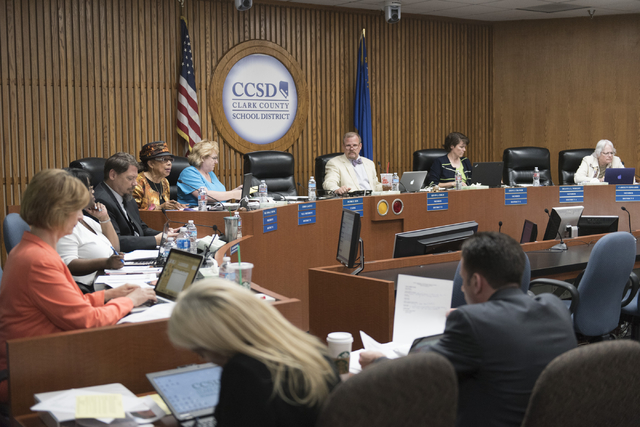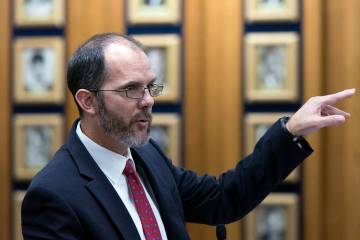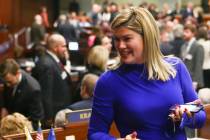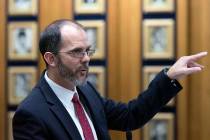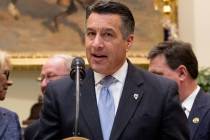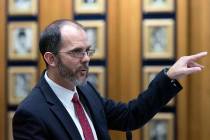Late-breaking CCSD bill would delay breakup for a year
Clark County School District officials would have another year to implement a state-mandated reorganization under an emergency bill introduced in the Nevada Legislature — a provision drawing ire from some of those involved in the process.
Assembly Bill 516, a so-called “trailer” bill introduced Monday, proposes changing the timing and details of the breakup of the nation’s fifth-largest school district. Other changes would include altering the funding split between the district and individual schools and dropping the requirement that the district consult with school organizational teams when there are budget conflicts.
The bill, sponsored by Senate Majority Leader Aaron Ford and Assembly Speaker Jason Frierson, both Las Vegas Democrats, is a follow-up to Assembly Bill 469, which was co-sponsored by both men and signed into law this month.
District officials said they did not request the delay.
‘Continuing the conversation’
In a statement, Frierson said the intent of the bill is to give stakeholders a chance to address their concerns.
“I look forward to continuing the conversation with everyone involved and hope they will present the case for their changes to the Education Committee,” the statement said.
Ford did not immediately return a request for comment.
Although intended to smooth over some concerns about the reorganization, the move seems to have prompted new ones, including concerns about the provision that would push back the effective date to the 2018-19 academic year.
“I really believe that we’re starting to build some momentum around this effort. It’s been building for some time now, and all it would do is slow things down,” said Glenn Christenson, chair of the Community Implementation Council, created by the Legislature after the 2015 reorganization bill passed. “This cultural change is not easy, It’s not easy at all.”
Although AB469 was sponsored by Ford, Frierson, Senate Minority Leader Michael Roberson, R-Henderson, and Assembly Minority Floor Leader Paul Anderson, R-Las Vegas, the cross-party cooperation was absent on Monday.
Roberson called the new bill an “abomination” on Twitter, saying it should be vetoed immediately. He and Anderson did not immediately return requests for comment.
Student success
The state Department of Education also criticized the bill, saying that delaying the implementation of the reorganization is not in the best interest of students.
“This doesn’t seem to be in the spirit of the bipartisan bill that was passed previously. At the end of the day, this is about students, and delaying this reorganization only delays changes that will improve student success,” spokesman Greg Bortolin said.
Former Assemblyman David Gardner, who sponsored the 2015 legislation, said he didn’t understand why the trailer bill was introduced.
“It’s trying to relitigate things that we’ve talked to and debated for two years now. I’m a little confused with what the point of the bill is,” he said Tuesday.
Gardner said a number of provisions in the bill would strip parents and local communities of decision-making abilities, flying in the face of the purpose of the original plan.
“I wish we could give them more power. That was the whole idea,” he said. “Give power to the people who are with these kids every day, and they’ll make the best choices. That’s the hope.”
Bill specifics
AB516 is the latest in a series of moves aimed at changing how the district operates in hopes of bolstering student achievement. In 2015, the Legislature approved and Gov. Brian Sandoval signed a bill to break up the school district to give principals at its 357 schools more control over budgets and staffing. A regulation was developed between legislative sessions, and AB469 was introduced and signed into law this year to further cement the measure.
The initial law called for implementation in the 2018-19 year. The regulation crafted in the interim moved up the start date to the 2017-18 year. The new bill would set that date back to the original plan.
District officials expressed disappointment with the funding split laid out in the bill.
The district would have to allocate 70 percent of funding to schools, keeping 30 percent for administrative services at the district level. In the second year, the split would change to 75 percent for schools and 25 percent for administration.
The original bill called for starting with an 80-20 percent split that would eventually shift to 85-15.
District officials wanted to delay splitting any funds until the second year.
“While the district is working to increase the percentage of funds going to schools, we believe additional time is needed to thoughtfully work through the steps necessary to ensure a successful transition,” CCSD spokeswoman Melinda Malone said in a statement.
A $17 million funding request from the district to revamp its human resources system, which was attached as a fiscal note to the bill that has been signed by Sandoval, was not addressed in the trailer bill.
The Assembly education committee is scheduled to hear AB 516 on Wednesday.
Contact Meghin Delaney at 702-383-0281 or mdelaney@reviewjournal.com. Follow @MeghinDelaney on Twitter.



